Astrolabe 8: Three books, a brave new world, and the trouble with New Game+

Three Books You Should Know About
For a variety of reasons (stemming from existential dread to an overabundance of amazing friends working on amazing books, review commitments, and personal projects), I haven’t read as many books this year as I normally do. Specifically, I haven’t had the chance to really sit down and chip away at my teetering to-read pile. So, now that I’ve got the chance to catch up on the books I really want to read, I thought it would be fun to share a few of them I’m particularly jazzed about.
(As you might expect, this is replacing my usual recommended reads column this issue!)
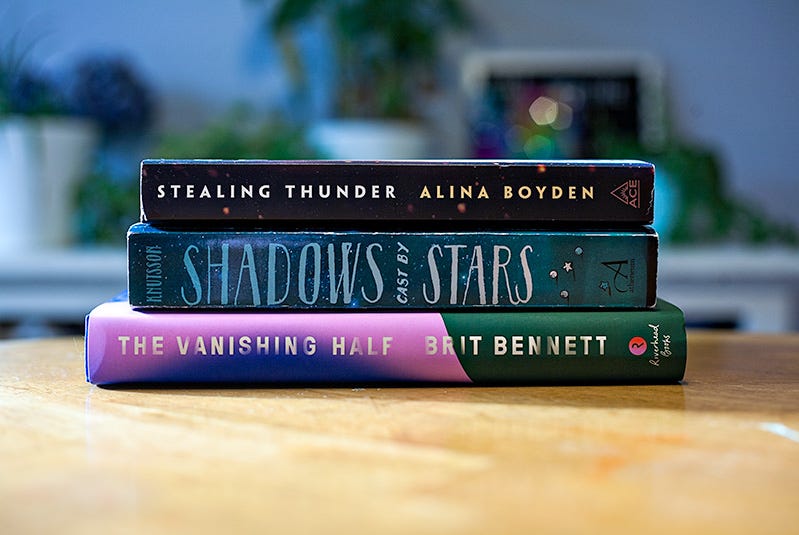
The Vanishing Half by Brit Bennett

I just finished this a week ago, and, holy wow, what a book.
The Vanishing Half weaves a decades-long story about the Vignes twins, Desiree and Stella, as their lives are pulled part, starting the unravelling of a thread that impacts the those around them—from lovers to children. It’s lovingly told, gorgeously written, and impossible to put down.
The story is ostensibly about Desiree Vignes and her twin sister, Stella, but it weaves through and around several other people in their lives, and through their eyes we get a rich, multi-layered understanding of the Vignes twins. Our lives are a complex web of coincidences, inter-dependencies, and plans gone awry, and Bennett ambitiously navigates tis in a way that layers on complexities without ever becoming confusing, creating a meticulously plotted story that somehow feels just as messy as real life.
Bennett has this amazing ability to winnow her characters down into their barest, rawest form, and create an incredible narrative using the emotions she finds within them. What amazed me throughout is how Bennett was able to thread the book’s overarching theme of how choices define our lives, of how we’re followed by our vanishing half—the person we could’ve been, might’ve been—into each of the central stories. Desiree and her sister Stella are immensely different, and so are the kids, Jude, Reese, and Kennedy, and yet they all experience this. Bennett’s a gorgeous storyteller, but her truest strength as a writer is her understanding of human complexity and contradiction.
A week’s passed now, and I still can’t get Desiree and Stella out of my head.
Shadows Cast By Stars by Catherine Knutsson
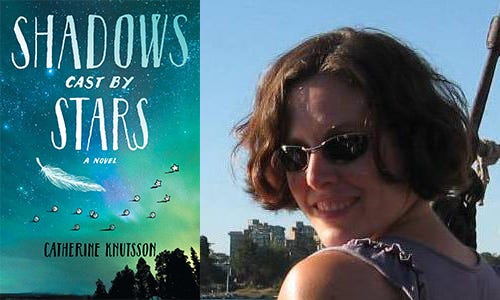
Shadows Cast By Stars is a post-apocalyptic SF fantasy set in a world savaged by a deadly viral pandemic. It’s… honestly a little close for comfort right now, but the way Knutsson centres the narrative on the Indigenous Peoples of a fictional Vancouver Island, known as The Band, creates an amazing backdrop of history, lore, and culture that was easy to sink into. It creates a beautiful foundation for this book’s story of searching for belonging, our connection to the spiritual world, and what it means to find a family.
In Knutsson’s future, Indigenous Peoples are hunted for their blood, which carries the only known antibodies to the plague. Cassandra, along with her twin brother Paul and father, escape the plague-ravaged Corridor for The Island. There they seek protection not from the virus, but from the government that covets their very livelihood. Once on The Island, Cass discovers a connection with the spirit world she didn’t know she had, and, with the help of many new friends, and a few adversaries, she must use these newfound powers to save her friends and community.
Knutsson has an easy voice, and the book is filled with some astounding imagery. Living on Vancouver Island, I can attest to Knutsson’s ability to capture the beautiful landscape that defines the island. She mixes west coast Indigenous mythology with contemporary post-apocalyptic worldbuilding in a confident way that really sets Shadows Cast By Stars apart from novels that tread similar ground. Most importantly, Knutsson centres her characters’s conflicts at the heart of the novel, and by its final page, you’ll care so dearly for Cassandra and the various people who surround her. You’ll ache with her loss, and feel the deep welling of her love and bravery long after you’ve finished the book.
Stealing Thunder by Alina Boyden
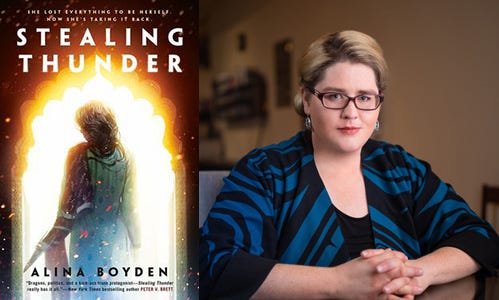
I haven’t read Alina Boyden’s Stealing Thunder yet, but after Demon Cycle author Peter V. Brett raved about it during an interview with Terry Brooks, I knew I had to have it! The cover immediately caught my eye, but it was the description that really sold me on Boyden’s debut:
Protecting her identity means life or death in this immersive epic fantasy inspired by the Mughal Empire.
In a different life, under a different name, Razia Khan was raised to be the Crown Prince of Nizam, the most powerful kingdom in Daryastan. Born with the soul of a woman, she ran away at a young age to escape her father’s hatred and live life true to herself.
Amongst the hijras of Bikampur, Razia finds sisterhood and discovers a new purpose in life. By day she’s one of her dera’s finest dancers, and by night its most profitable thief. But when her latest target leads her to cross paths with Arjun Agnivansha, Prince of Bikampur, it is she who has something stolen.
An immediate connection with the prince changes Razia’s life forever, and she finds herself embroiled in a dangerous political war. The stakes are greater than any heist she’s ever performed. When the battle brings her face to face with her father, Razia has the chance to reclaim everything she lost…and save her prince.
Fantasy is defined in part by the absolute vastness of its boundaries. Nothing’s off limits. And yet, over the history of the genre, it’s become enamoured with its past, and, along the way, forgotten that it can be a home for people at every point on humanity’s spectrum. We see so many cis-gendered heroes following the same quest, over and over again, and we’ve seen it fail again and again to recognize and elevate LGBTQ+ characters. Boyden, a trans activist, wants to change that with Stealing Thunder, and I think that’s tremendously exciting. Not just for readers like me, who benefit from reading books that don’t centre heroes who share our gender, ethnicity, and sexuality, but especially for young trans readers who should expect to find themselves in the stories they love.
“I just want trans women, especially young trans girls, to read this book and feel seen and represented,” Boyden told BookPage’s Stephanie Cohen-Perez. “I want them to realize that they can be anybody they want to, that they can dream as big as anyone else, that the world is as much their oyster as anyone else’s.
“And I realize my readership is largely not going to be trans women, young or old. That’s just a demographic reality. So for the bulk of my readers, especially for my cis readers, I just hope that they come away from this book having our existences demystified a little bit.”
And, as the cherry on top, the book also just flat out sounds great! I love fantasy settings inspired by non-European cultures, so Boyden’s familiarity with the Mughal Empire is sure to form the backbone for a wonderful new world to explore, and I’m a sucker for stories about self-identity, family, and politics. I can’t wait to bring y’all a full review.
Out & About
(Out & About is where I highlight my work around the web—some recent and some old favourites.)
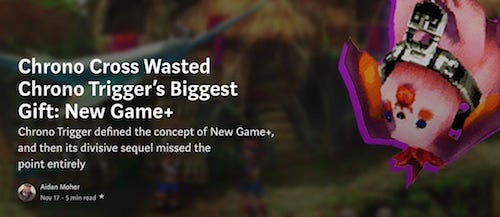
Over on Insert Cartridge, my blog about retro games, JRPGs, and gaming as an adult, I’m taking a look at the maligned, and brilliant, and messy Chrono Cross. Specifically, how it misused one of its predecessor’s greatest gifts: New Game+.
Where Chrono Cross falls apart, however, is its narrative, exploration, and characters. Chrono Trigger was a straight-forward, fast-paced adventure that relied more on set pieces, self-contained vignettes (save the queen, help the starving people, defeat Azala), and a relentless pace, than obtuse themes, overblown dialogue, and labyrinthine plot points. Chrono Cross is… the opposite of this. Its story is confusing, the critical path is often unclear, and its reliance on big brain plot twists and weirdly obtuse themes is headache inducing.
Read “Chrono Cross Wasted Chrono Trigger’s Biggest Gift: New Game+”
Some more:
- Spellbound : The Familiar Faces Creating the Story for Magic: The Gathering (Tor.com)
- A Newbie’s Guide to Brandon Sanderson, the Cosmere, and the Stormlight Archive (Barnes & Noble SFF Blog)
- Blood Matters: Growing Up in an SF/F House (Uncanny Magazine)
LTTP—Final Fantasy VI: Brave New World 2.0 (Super Nintendo, 1994)
( LTTP stands for “Late to the Party” and is a regular column where I let Twitter decide which retro game I’ll play for an hour. Do your worst, Twitter!)
Instead of new games, this time around for LTTP, I picked two classic SNES JRPGs and targeted some of their most popular and ambitious romhacks. Over on Twitter, much to my surprise, Final Fantasy III: Brave New World beat out fan-sequel Chrono Trigger: Crimson Echoes by a fair margin. Brave New World is a comprehensive romhack of FFIII that adds new Quality of Life features, a major overhaul of the esper system, and a complete (and I mean complete) rebalancing of gameplay systems that focuses on making the game’s cast more broadly diverse, and the combat more complex.
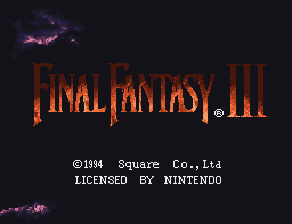
One of the first things I noticed was how much the development team cleaned up the game’s UI. The original Final Fantasy III isn’t a bad looking game, but 25+ years later, we’ve come a long way in terms of UI design, and Brave New World is cleaner, more efficiently organized, and has re-jigged the flow of information to make it more easily grokked. In addition, we’ve got some other small improvements, like the ability to run automatically, without having to waste a relic spot on Sprint Shoes, and the option to dual-wield or two-hand-wield weapons right off the bat, too.
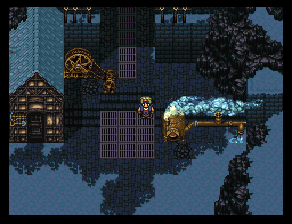
During my Twitch stream, a few members of the development team showed up in chat, which was a lot of fun. One of the things we discussed was the approach to tweaking the game’s difficulty. The original Final Fantasy III is very easy, especially for those who know how to manipulate the esper system to its fullest advantage, so the team wanted to make things more challenging. Their goal, however, was to do so in a way that was smarter, rather than just plain harder, and they did so by tweaking the stat system so that everything from vigor to evade plays a unique role in battle. On top of this, the battles are more strategic and tactical than the original. You’re not going to get through Narshe Mines by just mashing A anymore, let alone the rest of the game.
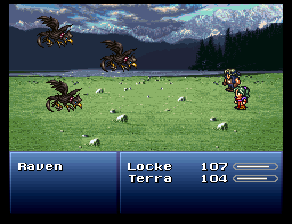
However, I noticed that the Whelk boss, which you fight about five minutes into the game, was much easier than in the base game. This was intentional. They realized that no one wanted a challenge right off the bat, during what is essentially the game’s tutorial. So they eased up there, but, about give minutes later, just after I saved, I died quite quickly on a basic mob battle against rats. Puzzled, I checked chat, and they suggested I spread out my fire magic spell. Sure enough, it melted right through those rats, and I was good to go. The game goes out of its way to teach you how to play this new version of Final Fantasy III, and I thought it was clever how it eases up during the interactive tutorial, but then brings out the hammer right after you’ve reached a save spot. You realize during that rat fight that you’re gonna have to learn to play Final Fantasy III all over again, but the frustration of this lesson is low because you’ve just saved. This sort of thoughtful design is found throughout the game’s first hour, and makes me eager to get deeper into the game to explore its more complex and rewarding systems.
Final Fantasy III: Brave New World is available on Romhacking.net. It must be applied to a US ROM of the original SNES version of Final Fantasy III, which you’ll have to legally acquire on your own.
Quest Markers
(Quest Markers is a collection of the coolest stuff I’ve read around the web lately.)
- The Window (TransGamer Thoughts)
- A Brief History of Dragons Throughout Western Literature (Tor.com)
- Watch Documentary ‘10 Years With Hayao Miyazaki’ Online For Free (Cartoon Brew)
- Tell Me Why's First Episode Is Too Real (Kotaku)
- How Serial Box is disrupting traditional book publishing (Simon Owens’s Tech and Media Newsletter)
- Data Heroes of Covid Tracking Project Are Still Filling U.S. Government Void (Bloomberg)
- Podcast: Episode 340: Final Fantasy IX (Retronauts)
- The Problems with PLATO (The History of How We Play)
- YouTube: The Last Bronycon: a fandom autopsy (Jenny Nicholson)
- Before Rhythm of War: A Quick and Dirty Recap of Brandon Sanderson’s Stormlight Archive (Tor.com)
- The forgotten Flash Website movement (when websites were 'the new emerging artform') (Nathalie Lawhead)
- About That Wave of Anti-Racist Bestsellers Over the Summer… (Lithub)
End Step
Recommending books is the foundation of my career as a fan writer and critic, so it brings me a lot of joy to point you toward three books that I think you’re gonna love. Got your own recommendations or just wanna say hi? Hit me up on Twitter: @adribbleofink!
Support
There are lots of ways to support Astrolabe and my other work. Check ‘em out!
- Patreon: http://patreon.com/adribbleofink
- Ko-fi: http://ko-fi.com/aidanmoher
- Paypal: http://paypal.me/AidanMoher
Keep In Touch
Enjoy Astrolabe? Want more SFF and retro gaming goodies? You can find me on Twitter and my website.
Credits
Astrolabe banner photo by Shot by Cerqueira on Unsplash

